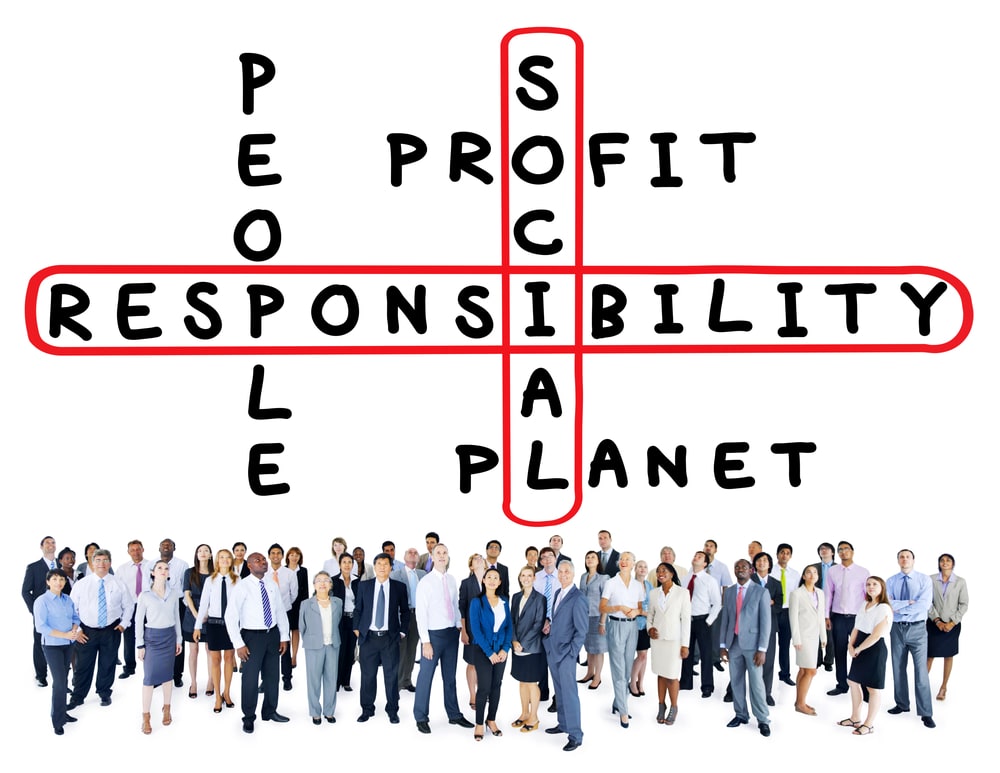Lest anyone think that corporate social responsibility is fluff, they should consider the following: Fortune Global 500 firms spend roughly $20 billion on corporate social responsibility annually. (1) It is literally big business.
What, exactly, is corporate social responsibility? More than 100 Fortune 500 chairmen and chief executive officers define it as the following: (2)
- Delivering value to customers by meeting or exceeding expectations
- Investing in employees by compensating them fairly, providing critical benefits, educating and training them to fully prepare them for accelerated changes happening in the world and encouraging diversity, inclusion and respect across the board
- Acting as good, fair and ethical partners to suppliers
- Supporting local communities and implementing sustainable practices to preserve the environment
- Delivering long-term value to stakeholders, being transparent with them and engaging effectively with them
These goals seem straightforward and achievable, yet many companies stumble in their attempts to meet them.
Execution Is Everything
While it is relatively easy to fulfill corporate social responsibility in one or two aspects of a business, the organization must implement these measures in every area to truly demonstrate it.
For example, when it comes to valuing all stakeholders, including employees, the business must incorporate these measures into the recruiting and hiring process, sales, customer and IT support, interactions with vendors, involvement in programs in the local community and interaction with leadership in various markets and critical industries where laws impact stakeholders.
Additionally, this entails making conscientious decisions about the company a business keeps whether this involves sponsorship opportunities, volunteer efforts, donations or contributions, who they purchase from or the types of products they purchase.
The disconnect that many organizations have between their perception of corporate social responsibility and the full extent of what is required is certainly understandable. In the past, corporate social responsibility was about taking on one or two projects and lending budgetary support to help improve communities. While these projects do make an impact, the results are often short-lived.
A recent study by Global Affairs (3) revealed that despite well-intentioned efforts, few of these efforts translated to significant, long-lasting improvements due to a lack of real change on both ends.
- Advocacy is necessary to ensure that changes made roll out across the industry and market and that they are embraced by lawmakers, decision-makers and those with influence to establish real change.
- Communities producing raw products, offering services or completed products need assistance in developing and making information available about the issues they face.
- Buyers and investors need to be more diligent about sourcing to understand the origins of where products and services originate and to then factor in fair trade practices.
Major Changes Are Ahead
The recent global crisis forced co-workers to rely heavily on technology to interact. This is great for expediting engagement. However, it presents challenges when companies need the “feet on the ground” aspect of making changes that have a real, lasting impact. Communicating via a Zoom meeting and a mobile device is not the same as doing so firsthand. This makes in-person communication essential. In today’s world, it may involve a team instead of one or two people.
The value of employees is becoming even more essential, especially those employees who align with corporate social responsibility goals, drive a positive corporate culture, encourage a positive work environment and serve as critical drivers for outcomes. Leadership will need to find new ways to recruit and retain top talent, but more importantly, proactively develop long-term plans for promotion and succession. The current climate is one in which employees must feel valued, encouraged and respected. The days of leading from the top down are flattening and workers want more equality and equity in the workplace.
Transparency across organizations and externally is now imperative. The words spoken, the behavior exhibited, and the relationships established can be searched and uncovered in a matter of minutes. People will define organizations by elements such as their connections and online reputation.
Fear will drive behavior and trends long after the recent crisis. Months of social isolation, lifestyle changes and the avoidance of a normal state will have lasting repercussions. These repercussions will cause issues with safety, trust, reluctance, anxiety, avoidance and changes in perceptions. Simply adapting to new circumstances will not guarantee the survival of businesses. Making major changes immediately is essential.
Avoiding the urge to sell everything under the sun and be everywhere at once will take companies far. Organizations should focus on two to three markets that have historically proven stable for them and evaluate either five to 10 products or three to five services that have consistently sold well in these markets. Leadership should focus its energy on improving marketing approaches, sales strategies and transforming them into stronger money makers. This will serve businesses not just now, but well into the future.
Uncertain times call for creative thinking. Contact Gavel International to be inspired with solutions that connect and engage your people.
____________________________
SOURCES:
1) https://www.economicpolicygroup.com/publications/business-backs-education-report-launch/
2) https://opportunity.businessroundtable.org/ourcommitment/#:~:text=Statement%20on%20the%20Purpose%20of%20a%20Corporation,-Americans%20deserve%20an&text=Businesses%20make%20and%20sell%20consumer,services%20that%20underpin%20economic%20growth
3) http://dx.doi.org/10.1080/23340460.2020.1789430
- 7 Myths That Make Your B2B Marketing Content Ineffective - November 25, 2024
- 9 Fun and Moving Ways to Empower Employees by Giving Back - November 18, 2024
- 13 Meaningful Questions to Ask at a Business Networking Event or Mixer - November 11, 2024







